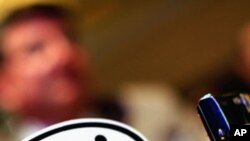Debra Kohl drove half-way across the country to be at a recent meeting in Washington of the Faith & Freedom Coalition.
She can't imagine why religion would not be a solution to America's problems.
"'Cause when you really open up your eyes and really look and see what's happening in our country, and in our culture, and our society, and our families and our children," she said, "and to not have a faith that says, 'Okay, it's bad. Things are bad.' But you know what? I have hope in a living God."
The hundreds of people who attended the meeting share one of her hopes: that President Barack Obama won't be reelected next year.
Conservative Christians - the so-called Religious Right - swayed many votes in U.S. presidential elections over the past two decades. But their influence was not as clearly felt in the 2008 election.
The Faith & Freedom Coalition is trying to resurrect that influence to help the Republican Party in 2012. Coalition president, Ralph Reed, said voter apathy among conservative Christians helped Obama in the last election.
"In 2008 - and this is a frightening statistic to consider - there were 17 million evangelical Christian voters who either weren't registered to vote, or were registered but didn't go to the polls," he told the audience.
Reed used to head the Christian Coalition, which mobilized religious conservatives for the Republican Party in the 1990s. But his political fortunes later suffered because of ties to a scandal involving Washington lobbyist Jack Abramoff.
Now, Reed is again a force in Washington. Almost every Republican presidential candidate for the 2012 election spoke at his meeting, including Mitt Romney, Jon Huntsman and Michelle Bachman, a darling of Tea Party movement.
The Tea Party's anti-tax, limited government message changed the American political landscape in last year's mid-term elections. And many conservative Christians agree with that message.
"And so what's happening is operatives, political operatives like Ralph Reed, are trying to weave the two agendas together because the Christian Right in this country is still very very strong," said liberal Presbyterian minister Jennifer Butler.
She is one of many Christians who argue that Jesus would oppose cuts to government aid for the poor, and worry about the combined electoral power of religious conservatives and the Tea Party.
Michael Cromartie of the conservative Ethics and Public Policy Center, says social values issues such as abortion and same-sex marriage - which have traditionally been high on religious conservatives' radar - won't take center stage in 2012.
"I think they won't, simply because of the state of where we are. And we're in an emergency situation," he said, adding that 2012 "will be about two things, the economy and the state of the war on terror."
Cromartie says that may make it easier for conservative Christians to vote for Romney and Huntsman - who some evangelicals don't consider to be Christian because of their Mormon faith - and Newt Gingrich - who has admitted to the 'sin' of adultery.















